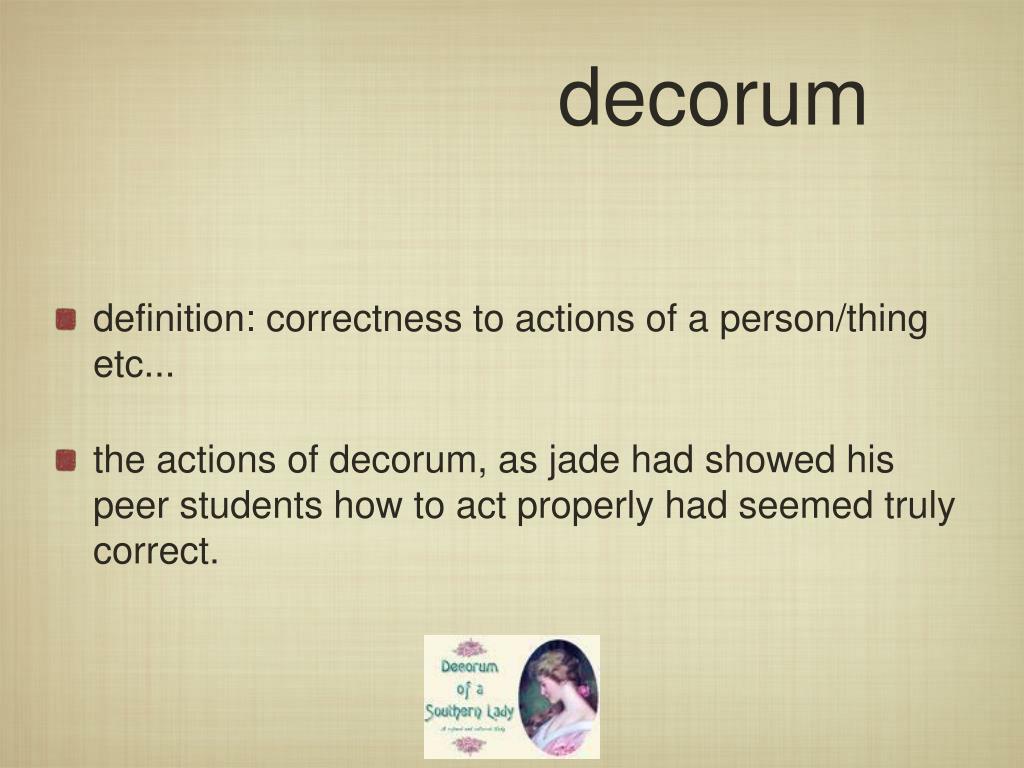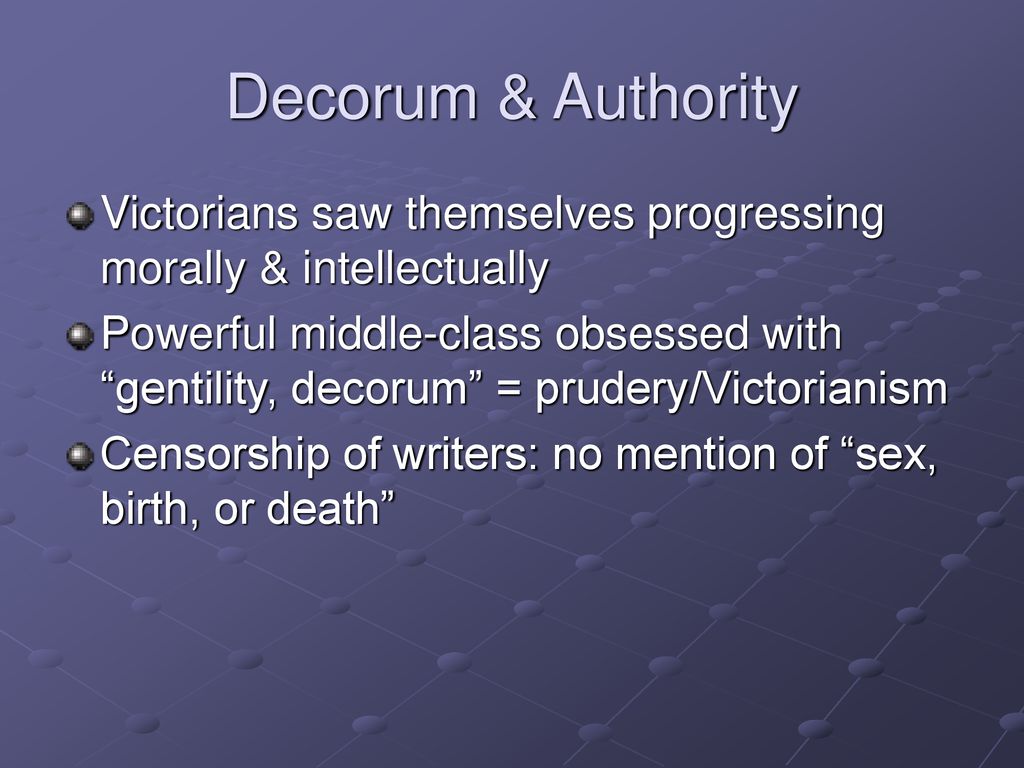Decorum Meaning - Understanding Polite Behavior
Sometimes, you walk into a room, or perhaps you are just talking with someone, and you can tell there is a certain way people are expected to act. It is not always written down, you know, but it is there, like an unspoken agreement. This idea of how people should carry themselves, especially in certain situations, is something that really shapes how we interact with each other every single day.
It is about what feels right, what seems fitting, and what makes everyone feel comfortable and respected in a given setting. Think about it: the way you talk to a close friend is very different from how you might speak to a new acquaintance, or perhaps a person in a position of authority. That difference, that shift in your actions and words, is a big part of what we are going to explore here. It is, in some respects, a very important part of how we make our way through the world with others.
We are going to take a closer look at this concept, often called "decorum," and what it truly means for how we live and communicate. It is not just about being polite; it is about a deeper sense of what is appropriate and respectful in all sorts of circumstances, from a fancy dinner to a serious court proceeding, and even in the way stories are told. So, let us talk about what this idea really involves.
Table of Contents
- What is the core decorum meaning?
- How does decorum meaning show up in daily life?
- What does it mean to have a sense of decorum?
- Why is decorum meaning important in different settings?
- Is decorum meaning just about being proper?
- How can you tell if someone is showing decorum?
- What are some examples that explain decorum meaning?
- What is the difference between decorum meaning and just being nice?
What is the core decorum meaning?
At its very heart, the idea of decorum points to how someone acts when they are keeping their actions in check, staying peaceful, and being pleasant. It is about having your behavior under control, making sure you are not overly loud or disruptive, and generally being kind to those around you. This sort of conduct is what many people consider to be the right way to carry oneself, you know, especially in public or formal situations. It is that sense of keeping things orderly and showing consideration for others.
This is not just about following a set of strict rules; it is more about an inner compass that guides your actions. It is a way of being that shows you respect the situation you are in and the people you are with. For instance, think about a quiet library; your actions there are probably a bit different from how you might behave at a lively outdoor gathering. That adjustment, that sense of what fits, is a big part of what this term covers. It is, basically, about acting in a way that is fitting and respectful, always.
How does decorum meaning show up in daily life?
This concept of decorum pops up in so many parts of our everyday existence, sometimes in ways we do not even think about. It is the reason we might speak in a softer voice at a memorial service or avoid making loud noises during a serious presentation. It is about understanding the mood of a place and adjusting your actions to match it. For example, if you were at a really nice dinner party, a loud burp would certainly not fit in, would it? That kind of action shows a lack of this sense of what is appropriate.
Another clear illustration of decorum is in a courtroom. There, everyone is expected to act in a very particular way. You call the judge "your honor," and you speak when it is your turn, with a certain level of seriousness. These are not just random rules; they are ways of showing respect for the legal system and the serious matters being discussed. These examples, actually, highlight how decorum is about actions that people generally see as correct, kind, and worthy of respect in specific settings.
What does it mean to have a sense of decorum?
To possess a sense of decorum means that you have a clear grasp of what actions are fitting or suitable for a given situation. It means you can read the room, so to speak, and understand the unwritten expectations for how people should behave. Someone with this quality understands that certain actions are just not appropriate in certain places or at certain times. They know how to carry themselves with a certain amount of grace and dignity, you know, which is really quite important.
It is about showing a kind of dignified propriety, which is a fancy way of saying you carry yourself in a way that is considered proper and respectable. This involves respecting the usual ways of doing things and what is considered normal or acceptable in a particular group or setting. If someone is said to have "no sense of decorum," it usually means they just do not seem to grasp what is proper or how to act fittingly in social settings. They might do things that make others uncomfortable or that go against what is generally expected, which can be a bit awkward for everyone.
Why is decorum meaning important in different settings?
The importance of decorum stretches across many different parts of life, from how we interact socially to how art and stories are put together. In polite groups of people, it is about knowing what is expected and acting in a way that shows respect for those around you. It is about following the practices that keep things running smoothly and pleasantly for everyone. This could mean knowing when to speak and when to listen, or how to dress for a certain event, for example.
Beyond social gatherings, the concept of decorum also applies to the world of writing and performances. Here, it refers to how well a part of a book or a play, like its writing style or the feeling it gives, fits its specific situation or the whole piece of work. For instance, a very serious play would probably not have a character suddenly break into a silly song and dance, unless it was meant to be ironic. That would not fit the overall feeling or purpose of the work. This shows how decorum is about the rightness of an element within a larger structure, making sure everything works together as it should, so to speak.
Is decorum meaning just about being proper?
While decorum definitely includes being proper, it is actually a bit more than just following a list of rules. It is about having a certain quality or state of being that shows you are aware of what is suitable and respectful in any given situation. It is about exhibiting a dignified propriety, which means carrying yourself with a sense of worth and respectability, not just doing what you are told. This suggests a deeper understanding of social cues and expectations, rather than just surface-level obedience.
It is about acting in a way that is not only correct but also carries a certain weight or grace. Think of it as an inner sense of what is right for the moment, which then guides your outward actions. It is about showing that you value the people and the place you are in, and that you understand the unspoken rules that help everyone feel comfortable and respected. So, yes, it is about being proper, but it is also about a more thoughtful and respectful way of moving through the world, which is really quite nice.
How can you tell if someone is showing decorum?
You can usually spot someone who is showing decorum by observing how they adjust their actions to fit the situation. They will typically appear collected, calm, and pleasant, making sure their actions do not cause any disturbance or discomfort for others. It is about their overall conduct and how well it matches the expectations of the environment they are in. For instance, they might speak quietly in a library, or wait patiently in a queue, showing a general respect for the established norms.
Another way to tell is by noticing if their behavior seems to fit the general mood or seriousness of the setting. If they are in a formal place, their actions will likely reflect that formality. If they are in a more relaxed setting, their actions will still be respectful but perhaps a little less stiff. It is about that sense of appropriateness, that feeling that their actions are just right for the moment. Someone with this quality will, in some respects, make others feel at ease because they are clearly aware of how to act.
What are some examples that explain decorum meaning?
Let us go back to that example of the loud burp at a fancy dinner party. That is a pretty clear picture of what *not* showing decorum looks like. It is an action that is just not fitting for that kind of setting, which is supposed to be refined and pleasant. It goes against the expected behavior for such an occasion, and it would likely make other guests feel a bit uncomfortable. This shows how decorum is about fitting in with the established expectations of a particular social event.
Another strong example comes from the courtroom. The rules there, like everyone calling the judge "your honor," are all about maintaining decorum. These are specific actions that are required to show respect for the authority of the court and the seriousness of the proceedings. It ensures that the environment remains orderly and dignified, which is really important for justice to be carried out properly. These examples, actually, highlight how decorum is about behavior that people generally see as correct, kind, and worthy of respect in specific settings, whether it is a social gathering or a formal institution.
What is the difference between decorum meaning and just being nice?
While being nice often overlaps with decorum, they are not exactly the same thing. Being nice is more about general kindness, friendliness, and having good intentions towards others. You can be nice to someone by offering a compliment or helping them out, regardless of the specific setting. It is a broad way of interacting with people in a positive manner. Decorum, however, is a bit more specific; it is about acting in a way that is not just kind, but also suitable and respectful for the particular circumstances you are in.
Decorum is about understanding the context and adjusting your actions accordingly. For instance, being nice might mean you smile at everyone you meet. But decorum might mean you do not laugh loudly during a serious lecture, even if you are generally a very nice person. It is about the appropriateness of your actions, your words, and your overall conduct in a specific situation. So, while a person showing decorum is usually also a nice person, the focus of decorum is on fitting in with the established ways of behaving in a particular place or time, which is, you know, a subtle but important distinction.
In short, decorum is about how we carry ourselves, making sure our actions are collected, peaceful, and pleasant, always fitting the situation. It means having a good grasp of what is suitable and respectful, whether you are at a fancy dinner or in a courtroom. It is about honoring the usual ways of doing things and showing dignity in your behavior. This idea helps us understand why certain actions are expected in different places, ensuring that our interactions are always appropriate and considerate.

PPT - Adversity PowerPoint Presentation, free download - ID:6956948

The Victorian Period ppt download

Decorum - Definition, meaning and examples | WordUp App